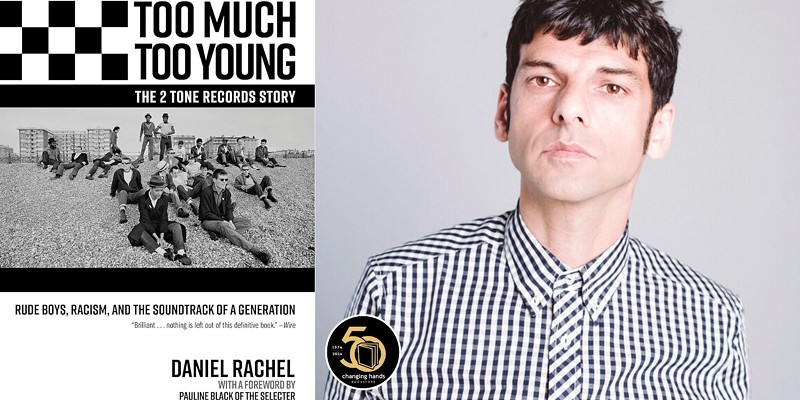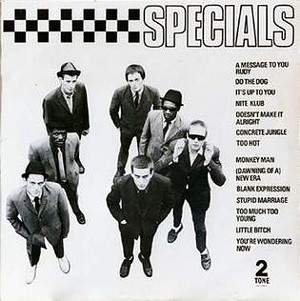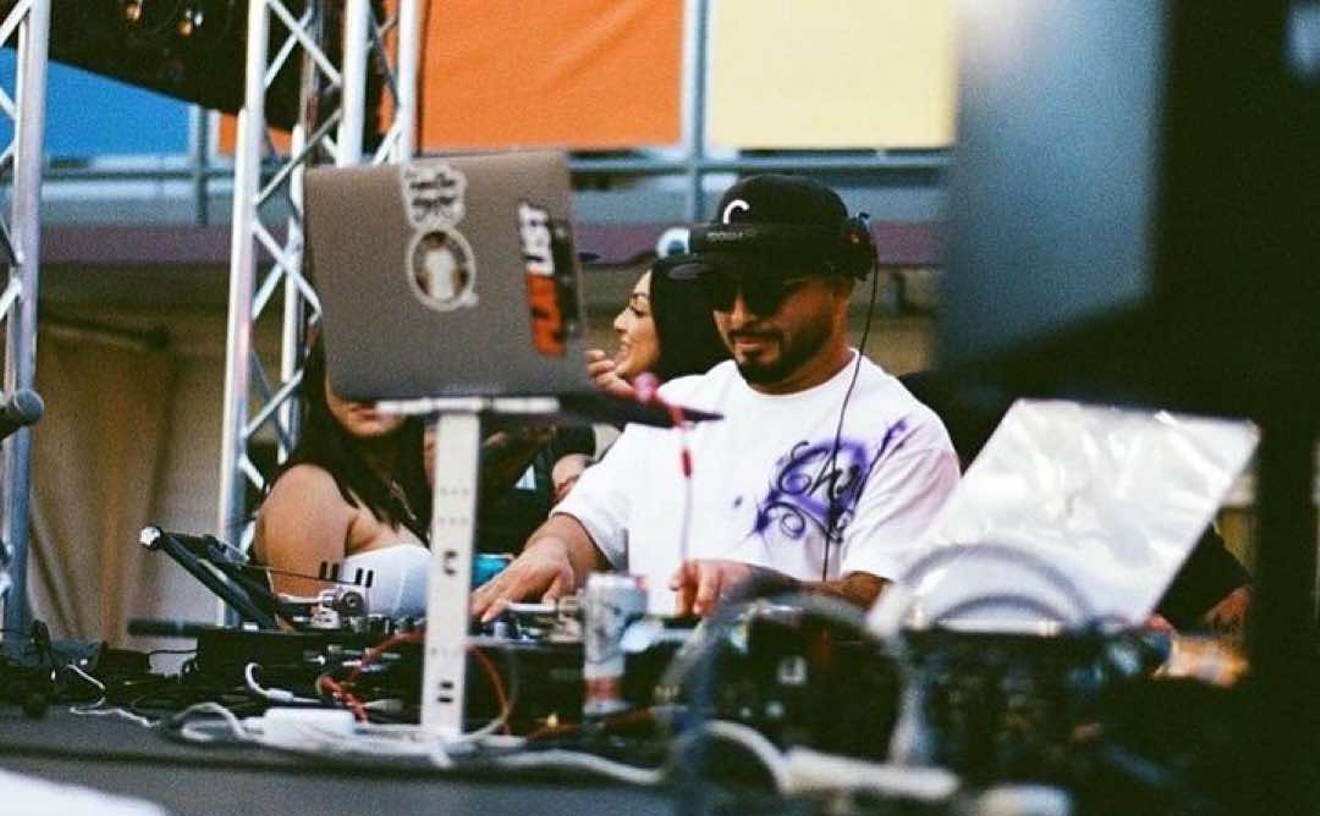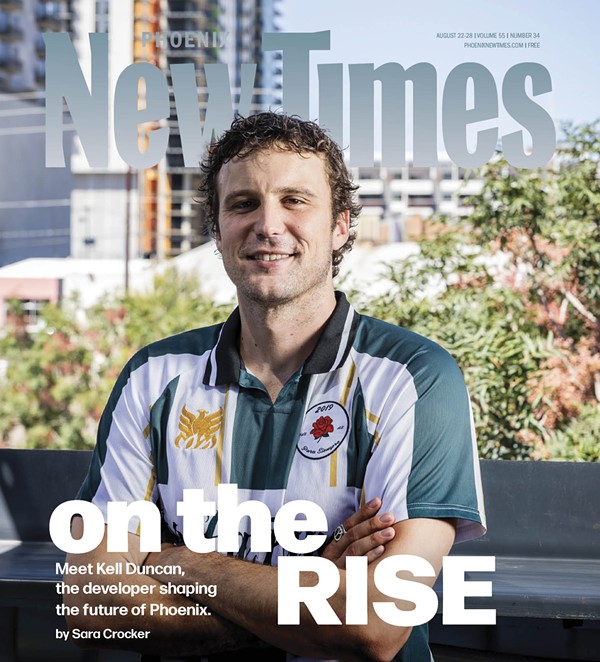Two-tone ska, one of Great Britain's most influential musical eras, arrived on the heels of Margaret Thatcher-era mass unemployment and ongoing racism following decades of immigration from the West Indies and Asia.
After the first wave of ska, which came out of Jamaica in the 1960s, this second wave of ska and its punk-meets-reggae flavor would provide an outlet for the disaffected youth of Great Britain at that time and be indelibly associated with label 2 Tone Records.
Veteran Birmingham, U.K., music journalist and musician Daniel Rachel’s scintillating 2023 book, "Too Much Too Young: The 2 Tone Records Story: Rude Boys, Racism and the Soundtrack of a Generation" chronicles the fascinating era. The book made end-of-the-year best books lists at media outlets such as The Times, Uncut magazine and Louder Than War.
Rachel will sign and discuss the book at 7 p.m. on Wednesday at Changing Hands Bookstore in Tempe. The discussion will be moderated by music writer Marc Masters, author of "High Bias: The Distorted History of the Cassette Tape."
“Well, there’s never been a comprehensive account of the 2 Tone movement. For something that defined British culture for a two-year period, 1979 to 1981, that’s surprising,” Rachel says. “I’ve grown up a fan of 2 Tone and so it’s a fulfillment of a teenage dream, really to be able to meet all of the musicians that were in the bands and those around 2 Tone that made it happen.”
Rachel tells the story of the 2 Tone movement from its working-class rebellion beginnings to its chart successes, impact on music and fashion and enduring legacy. Through interviews with a number of musicians of the time, he gathers recollections on the pressure of fame, use of drugs, infighting and eventual disenfranchisement that would lead to 2 Tone's demise.
What made 2 Tone so unique is the three-tiered influence it would have, as Rachel sees it.
“That’s the incredible thing about 2 Tone," he says. "It worked on three levels: the dancing and the great sound of the records; the visuals that you wanted to either replicate by drawing, or adjusting your wardrobe accordingly; and a deeper third level of social and political consciousness.”
The 2 Tone main roster was composed of The Specials, English Beat, Madness, The Selecter, Bad Manners and The Bodysnatchers.
The song that would forever put ska and 2 Tone on the map was The Specials' single “Gangsters,” released in May 1979. Keyboardist and 2 Tone Records founder Jerry Dammers' farfisa-pumping organ sounds volleyed with bass leads and interspersed punk guitar punctuated by the dueling vocals from singer Terry Hall and toaster Nevill Staple. (Toasting is a vocal style that entails chanting over a rhythm.)
“The first song I heard was 'Too Much Too Young' that I can consciously remember (belonging) to 2 Tone," Rachel says. "I was swept away by the speed of the song, the exuberance of the song, the kind of strange mix of two lead vocals that reminded me of John (Lennon) and Paul (McCartney), which is very unique to all the 2 Tone bands. It was a punk rock version of Jamaican music."
In early 1980, “Too Much Too Young” hit No. 1 on the Billboard U.K. Singles chart. Then, in 1981, the band’s biggest hit, “Ghost Town," a harrowing, apocalyptic commentary on the dire economy in the U.K., also went to No. 1. In a brief two-year span, The Specials had a succession of seven songs hit Top 10 before the band split up (though they would regroup several times over the next three decades).
“The Specials recorded their second album ('More Specials') six months after the release of their first album,” Rachel says. “At that point, they were flying. Every single song they released was a major hit in the U.K. The Selecter, incrementally, went down the charts. I don’t think the consistency of the records was as good. Madness just elevated themselves and became the most successful singles band of the 1980s here.”
The English Beat, simply known as The Beat in the U.K., hit it big in 1980 with their debut album, "Just Can’t Stop It." The Beat’s dual vocals of frontman and singer Dave Wakeling and patois-tinged master Ranking Roger meshed with a more reggae-ish, but uptempo sound supported by sexy sax riffs of horn man Saxa. “Mirror in the Bathroom” would hit No. 3 followed by “Twist and Crawl" at No. 10. The band’s frequent use of calypso and Caribbean flavors would separate it from the other 2 Tone bands.
The only all-white band, Madness from the U.S. would get their skanking starting with their first single, 1979's “The Prince,” which paid homage to Price Buster, one of the first wave of ska’s superstars. This initial single would be the only 2 Tone single by the band; they jumped ship and signed with Stiff Records, where they would hit the charts consistently over the next five years.
But the real blows to the label would be mostly self-induced.
“The pressures that were put upon the band were their downfall,” Rachel says. “And those pressures were to deal with fame, managing success."
There were influences of drugs, and "the different classes (working class, middle class and upper class) within the bands, and the different educations those kids received. And that changes what you do and want out of the success of your own band," he adds.
Likewise, Rachel says The Specials, Selecter and the only all-female band The Bodysnatchers, led by Rhoda Dakar, all had issues that led to their breakups.
“In The Specials it led to breakup between Jerry Dammers and Roddie Byers, and then three from Fun Boys Three (Neville Staples, Terry Hall and Lynval Golding) who left (The Specials). And the Bodysnatchers seemed like a dysfunctional group from day one. And they only existed for 11 months from the first single to their last gig.”
“At the same time, all of those elements that I mention change when you look at The Beat and Madness cuz they are able to draw each other’s vulnerabilities and support one another because they go on to make multiple albums.”
Of all the 2 Tone acts, Rachel notes that The Beat was the band whose future seemed brightest, with three stellar albums and the support of some other up-and-coming alternative and New Wave-era groups.
“It’s a great shame The English Beat split after their third album, because the really looked like a band that was really going to conquer, say, North America," Rachel says. "They had R.E.M. and The Bangles and Bow Wow Wow supporting them; they supported Talking Heads, they played with The Pretenders."
In the end, 2 Tone holds a permanent place in many a ska fan's heart, and 2 Tone-inspired bands would dot the world map even in faraway areas like Asia and Latin America, but never they never reached the status, impact or magic of the 2 Tone groups. But for a trip down memory of the era of 2 Tone Records, "Too Much Too Young" is an excellent place to start.
Daniel Rachel "Too Much Too Young" book event. 7 p.m. Wednesday, Aug. 28. Changing Hands Bookstore, 6428 S. McClintock Drive, Tempe. Free to attend; book costs $32.95. Visit the Changing Hands website for more information.

Audio By Carbonatix
[
{
"name": "Air - MediumRectangle - Inline Content - Mobile Display Size",
"component": "18478561",
"insertPoint": "2",
"requiredCountToDisplay": "2",
"watchElement": ".fdn-content-body",
"astAdList": [
{
"adType": "rectangle",
"displayTargets": "mobile"
}
]
},{
"name": "Editor Picks",
"component": "16759093",
"insertPoint": "4",
"requiredCountToDisplay": "1",
"watchElement": ".fdn-content-body",
"astAdList": [
{
"adType": "rectangle",
"displayTargets": "desktop|tablet"
},{
"adType": "rectangle",
"displayTargets": "desktop|tablet|mobile"
}
]
},{
"name": "Inline Links",
"component": "17980324",
"insertPoint": "8th",
"startingPoint": 8,
"requiredCountToDisplay": "7",
"maxInsertions": 25
},{
"name": "Air - MediumRectangle - Combo - Inline Content",
"component": "16759092",
"insertPoint": "8th",
"startingPoint": 8,
"requiredCountToDisplay": "7",
"maxInsertions": 25,
"watchElement": ".fdn-content-body",
"astAdList": [
{
"adType": "rectangle",
"displayTargets": "desktop|tablet"
},{
"adType": "rectangle",
"displayTargets": "desktop|tablet|mobile"
}
]
},{
"name": "Inline Links",
"component": "17980324",
"insertPoint": "8th",
"startingPoint": 12,
"requiredCountToDisplay": "11",
"maxInsertions": 24
},{
"name": "Air - Leaderboard Tower - Combo - Inline Content",
"component": "16759094",
"insertPoint": "8th",
"startingPoint": 12,
"requiredCountToDisplay": "11",
"maxInsertions": 24,
"watchElement": ".fdn-content-body",
"astAdList": [
{
"adType": "leaderboardInlineContent",
"displayTargets": "desktop|tablet"
},{
"adType": "tower",
"displayTargets": "mobile"
}
]
}
]












